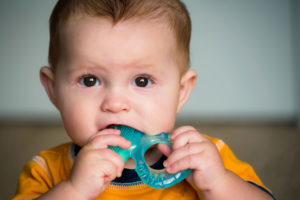 Teething describes the eruption of baby teeth, also called primary teeth, pushing through the gums into the mouth. Teething generally starts at around 6 to 7 months of age, but there can be variations. Some babies may have their first teeth in as early as three months, or after twelve months. The symptoms of teething can occur up to two or three months before the teeth actually appear in the mouth. Your child will have all twenty of their primary or baby teeth by the age of three.
Teething describes the eruption of baby teeth, also called primary teeth, pushing through the gums into the mouth. Teething generally starts at around 6 to 7 months of age, but there can be variations. Some babies may have their first teeth in as early as three months, or after twelve months. The symptoms of teething can occur up to two or three months before the teeth actually appear in the mouth. Your child will have all twenty of their primary or baby teeth by the age of three.
Order Of Teeth Appearance
The two bottom teeth in the middle are usually the first to erupt in the mouth. The top two teeth in the centre of the mouth usually follow afterwards. The next teeth in the eruption sequence are the lateral incisors, which are nearby. The first molars erupt next then comes the canines near the lateral incisors. The last teeth to come in are the second molars at the back of the mouth.
Teething Symptoms & Tips
Drooling: teething stimulates drooling. If your baby’s shirts are frequently soggy, gently wipe the chin throughout the day and use a bib.
Teething rash: frequent drooling will result in constant dripping that can cause chapping and chafing. Redness and rashes can occur around the mouth, chin, and even on the neck in some cases. Try to pat the drool away to prevent the rash. Using Vaseline to moisturize the area can help but check with your doctor or pediatric doctor first.
Gagging & coughing: excessive drooling can cause gagging and coughing.
Biting: when teeth begin poking through the gums it can cause a lot of discomfort and that discomfort is relieved by biting. Teething babies will try to bite on any object that they can find such as toys, rattles, pacifiers, etc.
Crying: babies may cry when the first teeth and molar teeth come in due to their size. Your doctor may be able to offer pain relievers for infants if necessary.
Avoiding feeding: some babies may want to avoid any foods that require a sucking motion since it can make the gums feel sorer. Talk to your pediatrician if this phase lasts for more than a couple of days.
Waking at night: pain during teething can affect the baby’s sleep. Try to soothe the baby by patting or with a lullaby. Avoid feeding at night.
Tugging & rubbing: since the nerve pathways connect the gums, ears, and check, babies may tug or rub their cheeks or ears. Check with your pediatrician if you suspect that the tugging or rubbing is not due to teething because it may be due to an ear infection.
Cold drinks & food: water that is icy can offer relief to sore gums for babies that are over six months of age.
Follow these tips to help make your baby’s teething an easier experience. If these tips do not work, contact your pediatrician.
About Dr. Joseph Salvaggio

Located in Brampton, Ontario Dr. Joseph Salvaggio has been practicing general, cosmetic, and implant dentistry for over 20 years. He enjoys interacting with his patients and helping to restore their oral health for better overall health as well. Meeting new patients, interacting and educating them is one of Dr. Salvaggio’s biggest joys. We encourage you to read our reviews or call us with any dental questions you have. We look forward to speaking with you and meeting you soon.
